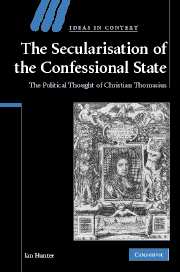
-
Select format
-
- Publisher:
- Cambridge University Press
- Publication date:
- September 2009
- December 2007
- ISBN:
- 9780511490590
- 9780521880558
- 9780521200837
- Dimensions:
- (228 x 152 mm)
- Weight & Pages:
- 0.52kg, 234 Pages
- Dimensions:
- (229 x 152 mm)
- Weight & Pages:
- 0.35kg, 236 Pages
- Subjects:
- Area Studies, History of Ideas, European History after 1450, History, European Studies, History of Ideas and Intellectual History
- Series:
- Ideas in Context (87)
You may already have access via personal or institutional login- Subjects:
- Area Studies, History of Ideas, European History after 1450, History, European Studies, History of Ideas and Intellectual History
- Series:
- Ideas in Context (87)
Book description
Christian Thomasius (1655–1728) was a tireless campaigner against the political enforcement of religion in the early modern confessional state. In a whole series of combative disputations - against heresy and witchcraft prosecutions, and in favour of religious toleration - Thomasius battled to lay the intellectual groundwork for the separation of church and state and the juridical basis for pluralistic societies. In this text, Ian Hunter departs from the usual view of Thomasius as a natural law moral philosopher. In addition to investigating his anti-scholastic cultural politics, Hunter discusses Thomasius' work in public and church law, particularly his disputations arguing for the toleration of heretics, providing a revealing comparison with Locke's arguments on the same topic. If Locke sought to base toleration in the subjective rights protecting Christian citizens against an intolerant state, Thomasius grounded it in the state's duty to impose toleration as an obligation on intolerant citizens.
Reviews
Review of the hardback:'Hunter’s excellent book offers the first really convincing account of Thomasius’ political thought in any language. It is a major contribution to our understanding of the early German Enlightenment and to the development of German political thought.'
Joachim Whaley Source: The English Historical Review
Contents
Metrics
Full text views
Full text views help Loading metrics...
Loading metrics...
* Views captured on Cambridge Core between #date#. This data will be updated every 24 hours.
Usage data cannot currently be displayed.
Accessibility standard: Unknown
Why this information is here
This section outlines the accessibility features of this content - including support for screen readers, full keyboard navigation and high-contrast display options. This may not be relevant for you.
Accessibility Information
Accessibility compliance for the PDF of this book is currently unknown and may be updated in the future.


